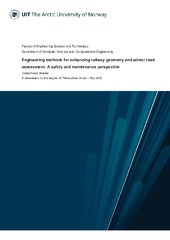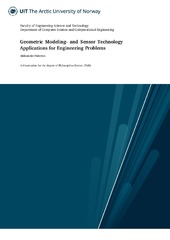An investigation of the robustness of distance measure-based supervised labelling of segmented remote sensing images
Permanent lenke
https://hdl.handle.net/10037/15761Dato
2019-06-03Type
Master thesisMastergradsoppgave
Forfatter
Kiærbech, ÅshildSammendrag
Unsupervised clustering methods on remote sensing images have shown good results. However, this type of machine learning needs additional labelling to be an end-to-end classification in the same manner as traditional supervised classification. The automation of the labelling needs further exploration. We want to investigate the robustness of a supervised automatic labelling scheme by comparing a segmentation with additional automatic labelling against a supervised classification method.
Using synthetic aperture radar (SAR) satellite images of sea ice from Sentinel-1, an automatic Expectation Maximization method with a Gaussian mixture model is used for the segmentation, taking into consideration the incidence angle variation within a SAR image. The additional labelling is a likelihood majority vote related to the Mahalanobis distance measure. The Bayesian Maximum Likelihood (ML) is used as the fully supervised reference method. The experiments of comparison are done using various amounts of training data and different percentages of mislabelling in the training data set. The classification results are compared both visually and using classification accuracy.
As training data size increases, the accuracy of the ML method tends to decay faster than for the segment-then-label approach, particularly when sample sizes per class are less than a hundred. As more contamination is introduced, the decay is not distinct, probably due to the large within-class variations in the training set.
Based on the results, the ML method generally gets a higher overall classification accuracy, but there are weak tendencies for the segment-then-label method to be more robust to decreasing training data size and more mislabelling.
Forlag
UiT Norges arktiske universitetUiT The Arctic University of Norway
Metadata
Vis full innførselSamlinger
Copyright 2019 The Author(s)
Følgende lisensfil er knyttet til denne innførselen:
Med mindre det står noe annet, er denne innførselens lisens beskrevet som Attribution-NonCommercial-ShareAlike 4.0 International (CC BY-NC-SA 4.0)
Relaterte innførsler
Viser innførsler relatert til tittel, forfatter og emneord.
-
Engineering methods for enhancing railway geometry and winter road assessment: A safety and maintenance perspective
Brustad, Tanita Fossli (Doctoral thesis; Doktorgradsavhandling, 2020-06-22)In many areas around the world there are limited transportation possibilities when travelling between key cities. If these areas also experience demanding weather conditions or geography, getting from A to B, during difficult conditions, is usually not optimal in regards to accessibility, safety, and comfort. Under challenging conditions, two essential elements in strengthening accessibility, safety, ... -
Geometric Modeling- and Sensor Technology Applications for Engineering Problems
Pedersen, Aleksander (Doctoral thesis; Doktorgradsavhandling, 2020-10-20)In applications for technical problems, Geometric modeling and sensor technology are key in both scientific and industrial development. Simulations and visualization techniques are the next step after defining geometry models and data types. This thesis attempts to combine different aspects of geometric modeling and sensor technology as well as to facilitate simulation and visualization. It includes ... -
Iceberg Drift-Trajectory Modelling and Probability Distributions of the Predictions
Baadshaug, Ole (Master thesis; Mastergradsoppgave, 2018-06-29)Moving icebergs represent a major problem for shipping, as well as for oil and gas installations in ice infested waters. To be able to take actions against hazardous icebergs, it is necessary to develop models for prediction of iceberg drift trajectories. Many models have been developed in order to do so, using different approaches. These approaches can be divided into two main categories, dynamic ...


 English
English norsk
norsk



